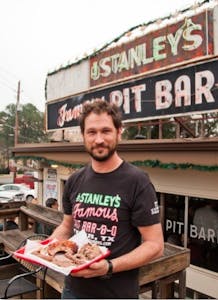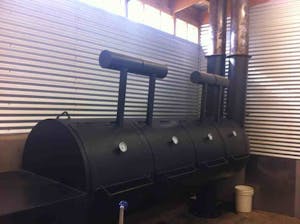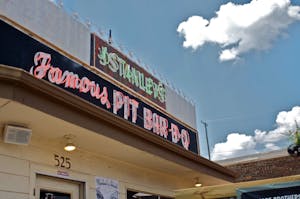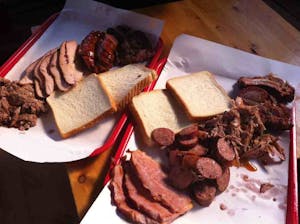
Owner: Stanley’s Famous Pit Barbecue since 2006
Age: 36
Smoker: Gas-fired rotisserie for ribs, offset wood-fired smoker for everything else.
Wood: Pecan
Nick Pencis was once the pitmaster at Stanley’s Famous Pit Barbecue in Tyler. He tried his best, but knew he had a real pitmaster when he hired Jonathan Shaw in 2009. Shaw now oversees things in the pit room while Pencis keeps an eagle-eye on running the business. Nick and I talked by the pool on the roof of the Nylo Hotel in Dallas while his wife Jennifer and Jonathan enjoyed the pool. They were all in town to cook for a charity benefit barbecue the night before. Pencis is a percussionist at heart and would catch himself taping a beat on the table as we talked. He told me to catch more of his drumming with the band Greyhounds. I picked up their album Liberty, and wouldn’t you know there’s be a song about barbecue. The last track is about going out east of Tyler and eating in a little shack called Pat Gee’s. I think Nick was just meant for the barbecue business.
Daniel Vaughn: How’d you get into barbecue?
Nick Pencis: It fell into my lap. I came back to Tyler to get my degree in Business. My plan was to seek out an opportunity in some sort of restaurant concept that included live music. A friend of mine had bought Stanley’s from J. D. [Stanley, the original owner]. I’d been spending a lot of time there anyway since about 2000. I’d sit on the back stairway and have this vision, like we could really do something back here.
DV: So you’d been daydreaming about this place in particular?
NP: Yeah, but when my friend asked me to come over and run the place, I wasn’t really looking for a job. I was bartending and going to school. That was my life. I was trying to get myself together. At school I was the old guy sitting at the front of the class paying attention.
DV: You say you were trying to get yourself together. Had you tried college before?
NP: Yeah. The first time was all about graphic design and marketing. I was playing in a band at the time so I wanted to produce our own promotional materials when we were out on the road. I had to learn how to do guerilla marketing anyway. I mean, you’re in a band from Texas and you’re about to play in Vermont for the first time, nobody knows who you are or cares that you’re there. How do you do something interesting enough in town to at least get a handful of people to show up and see you perform?
DV: And your job was to make a cool poster?
NP: More than that. This was before social networking. You had a website and that was about it.
DV: Who were you touring with and where did you go?
NP: I was touring with the Greyhounds all over the country. This was from 2000 to 2004.
DV: When did you make it back to Stanley’s?
NP: I went to work there in June of 2005. I had just met Jen [now his wife] just a couple months earlier. One of our first real conversations about our life path was about Stanley’s. She gave me some great immediate advice. She asked “If you find a quiet spot with just your thoughts, what makes you feel the most peaceful?”
DV: And barbecue was your choice?
NP: I dropped out of school, quit my cushy bartending job and took a big pay cut to go work at Stanley’s. When I started I didn’t really even have any promises about my future there. The owner said he wanted me to run the restaurant with the eventual goal of taking it over and maybe even franchising it.
DV: You put off a degree in business to go run a business?
NP: Yeah. Along with a wing and a prayer that I’d own it. That was my vision anyway.
DV: At what point did the business become yours?
NP: About six months into it we had a verbal agreement to buy it. We were working out the details and at the last minute this dude called it off. He said it was because we were about to get married, and he didn’t want to see the business ruin a good marriage.
DV: What was your response?
NP: I told him that was none of his f—ing business. I wanted him to honor his agreement. Instead he sold it to two other partners [in January 2006]. At that point I didn’t have a choice but to stay. I was about to get married.
DV: You just needed a job?
NP: Yes, no matter how bad it paid. Jennifer was a Pilates instructor and a personal trainer. She had good clients. She was my sugar mama for a bit there.
DV: You just came back to work at Stanley’s after the honeymoon?
NP: Yes, but when we got back we hatched a plan to buy the old Liberty Theater downtown and transform it into a music venue. When I was with the Greyhounds we wrote a record in the Liberty Theater and called it “Liberty.”
DV: What was your role in the band?
NP: Drummer
DV: I’m guessing you didn’t buy the theater.
NP: We worked on a deal in the background for a while. Then one night the two partners came in and the owner was there. He was drinking and I being a d—. I told him to stop acting like a jerk and he told me off. Then he fired me.
DV: He just fired his manager?
NP: Yes. I was running it from day to day, but I’d never done anything like it.
DV: In a year you went from being promised first dibs to buy the place to getting fired by the same guy who made the promise. Where did you go from there?
NP: The next day the partners called me and said they didn’t agree with what he’d done. They said they were going to buy him out and wanted me back. Then they let me buy into the business. It was May 26th of 2006.
DV: So you got what you wanted?
NP: I thought so. It was then that we all found out how much liability had been buried. The IRS and the Texas Comptroller was on our a—immediately. We almost didn’t make it out of that. It was about to crash and burn.
DV: Was it all back taxes?
NP: Payroll taxes, property taxes, liens, you name it. I ended up having to pay $20,000 of the payroll taxes that hadn’t been paid. When we took over we took the corporate identity too, so all the liability was now ours. The building wasn’t in great shape either. It was built in the 1940’s. J. D. Stanley had bought two barbecue joints and joined them together. He had added on little by little over time, but it was still tiny. Not to mention the location sunken down below all of the surrounding properties. Water came down to us and came in wherever it could, and that was a lot of places. It was challenging.
DV: With the money to buy in, the payroll taxes and repairs, we’re talking about a lot of money here. How did you make it work?
NP: We almost didn’t. I was about to call my friend and beg him for a manager’s job at Chili’s. My wife said no way. “We’re going to do this. You’re not working at f—ing Chili’s.” She quit her job and came to work with me every day. Failure was not an option to her. She stood up in these huge pivotal moments when I was so beat down. She just kept pushing. So we went back on Monday and just went day by day. Everything we put out had to be great. We couldn’t afford to lose a customer based on a crappy order. We needed people to rave about this little hole in the wall.
DV: You got back into marketing after all.
NP: The gratitude had to be in your face. I told everyone “Thank you for coming.” I had to get people to keep coming back through that door, and to hopefully bring three friends with them next time.
DV: Who was cooking for you then?
NP: Me. I was the pitmaster if you could call it that. I had inherited something that went from having a long history with big brick pits and steel barrel pits. It had been the real deal. Then the health department came in with the previous owner after it changed hands and made them rip it all out. I have a vivid memory of standing there in the old smokehouse with the brick pit and being fascinated by it. By the time I got back there it was all gone. In came the Ole Hickory rotisserie. That’s what I had to work with.
DV: And you just worked with that while you were the pitmaster?
NP: That’s what I had to work with. I owned my own business. I had a mortgage and a wife and a baby was coming. It was survival mode. We had to make do.
DV: When you say “we” does that mean you and Jen, or were the other partners still involved?
NP: It was just me and Jen. We were the ones operating it. The partners had other jobs, but still owned a portion.
DV: Did you ever buy them out?
NP: Yes. In 2008.
DV: Was that before the Texas Monthly Top 50 came out? [Stanley’s was on the Top 50 BBQ Joints list in 2008].
NP: Yes.
DV: Good timing.
NP: Yes. It all came down around the same time. Jen and I went to the partners and presented the status of the business. It wasn’t pretty. It was evident we were about to go down. We told them that the only way that we and the business could survive was for them to get out. A friend and former client of Jen’s was the owner of a strong independent bank and he said they’d give us some operating capital and help us leverage out the partners. We made the offer and they accepted. We finally had some room to breath and a line of credit. Finally, we could do some kitchen upgrades and just have some money to operate.
DV: How did the 2008 Texas Monthly Top 50 affect the business?
NP: It was awesome. We saw more traffic, but this was at a time where a normal weekday called for four slabs of ribs, four briskets and a couple pork shoulders. On the weekends we might need six racks of ribs. That’s all.
DV: The business is certainly healthier these days. You cook a lot more than that and get talked about with the greats around the state. Was there a big turning point? Some event that provide a permanent bump to the business?
NP: Not really. I know we just never lost sight of that fear of losing our a–. We had to have that personal attention and attention to detail. It just slowly built. We just did it right every day. We were growing, but we didn’t get ahead of ourselves. We’d hit a milestone and then hire another person or buy another pot to make more barbecue sauce. This was right about the time when I started understanding the depth and history to Texas barbecue.
DV: Did you go out searching for good barbecue?
NP: I went to Lockhart once by myself. I left late one night so I could be there in the morning when Smitty’s opened up. That’s when it came back to me. I grew up in Austin, my grandparents live in Buda, and I have an uncle in Lockhart. That’s when I started remembering. I felt like I’d been there before. Everyone knows when they had that moment when Texas barbecue hits them [smacking his hands together]. For me it was walking around the fire in the floor at Smitty’s. That experience made me realize I needed to honor the history of where I’m at.
DV: What did you change when you got back?
NP: I started messing around with our Ole Hickory. I played with building a fire in there in different ways and keeping the door open to let in some air. Those things aren’t built to draft. There’s no real airflow like an offset pit. I also got some books and started searching recipes. This was about the time that Jonathan [Shaw, Stanley’s pitmaster] came over.
DV: When was this?
NP: 2009.
DV: Did he come over from the Purple Pig [a barbecue joint in Flint, Texas]?
NP: He hadn’t worked there in a while. He had been laying floor for a construction company.
DV: Did you know him?
NP: Not really. We all lived on the same street and some mutual friends introduced us at a Halloween party. We had a very casual conversation about barbecue, but I had just let my right-hand man go for doing something stupid. I was under the gun again and needed help. Jen asked me about Jonathan. I didn’t think he’d want to leave his job so I didn’t want to bother him. Here comes Jen again with her cape on. She just went down to his house, knocked on his door and told him how bad we needed his help. She begged him to come down to Stanley’s and talk to me.
DV: How did that meeting go?
NP: I was on the roof fixing something and I saw him down in the parking lot. He said he heard that I needed some help. Between me yelling down at him, and him yelling back up, we worked out a deal to get him to come work for us.
DV: That’s a funny way to work out a job offer.
NP: What’s more hilarious is that we had to gut the kitchen as soon as he got there. His whole first week was spent laying floor in the new kitchen. That’s how we started.
DV: What else have you changed since you took over the building?
NP: We’ve done the kitchen three times. It’s been rewired and replumbed, we added a new cooler, a new pit room and huge outdoor patio with a bar.
DV: Did the new pit room also mean a new pit?
NP: Two of them. We have the trailered pit too. The big pit is Dutch. It’s eighteen feet long.

DV: That sounds like it would hold a bit more than six racks of ribs and four briskets. How much are you cooking these days?
NP: On a typical day we’re doing twenty-four to thirty briskets, eight pork butts and up to sixty racks of ribs. On a weekend day we’re putting out one hundred racks of ribs.
DV: How many hours does that last you?
NP: Barbecue is served form 11-9, and breakfast from 7-10.
DV: That’s a lot of hours. How many hours were you open when you started at Stanley’s?
NP: When we started there were three of us. There were also two locations, but the one in Whitehouse has since shut down. We were open as late as 10:00pm. We backed down those hours for a while until we got to 2:00pm and that just stuck for while. Now we’re back to 9:00, and from then until midnight we just sell sandwiches.
DV: You’re using the new patio as a live music venue, so that crazy idea to buy the theater kind of worked out in a different way.
NP: Yes it did. So did those visions I had when I sat on that back step and envisioned what it could be.
DV: What bands come through now?
NP: The Greyhounds were our first show.
DV: Did you sit in and ply drums?
NP: Yeah. I’ve gotten to do that few times.
DV: Your wife told me that you’re still a better drummer than you are a barbecue man. Is that true?
NP: I guess. I’m not really good at either one.
DV: But things are working out pretty well. It’s not often that somebody’s life comes full circle this quickly. You’ve got a very successful business and a live music venue, and all of it at the age of thirty-six. That’s a pretty quick turnaround from where you were when you dropped out of college for the second time seven years ago. Does it feel like you’ve made it?
NP: Not quite yet. Just last month we had that moment now that we have live music. We didn’t have that in Tyler where you could see someone other than a cover band at a bar. It was really all selfish since it was a way to get music to Tyler that we wanted to hear ourselves. We have to be here at the restaurant anyway. Now it’s starting to build into something cool. We’re building some trust with the locals that they can come have a good time at Stanley’s.
DV: You’ve had to build that trust with the style of barbecue you’re serving now too, right?
NP: Sure. It always needs to be about the food. We’re really jumping in to cooking more on Dutch and honor our roots. We’re trying to get better, but don’t want to get overconfident. We need a balance of keeping it the way it is, but making small changes. We don’t want customers saying to each other that we’re changing everything over here, but it’s always about doing it better.
DV: Do some of your long-time customers complain about any of the changes like the smokier brisket that has more fat and black pepper?
NP: No matter how you do it you can’t please everyone. If you leave a little more fat and crust on there some customers will complain that’s it’s way too fatty. If you go the other way, other customers will say how much we suck because we cut all the fat off. To help we have a question posted on our menu – “How do you like it? Lean, fatty, with bark, end cut?” We’re not mind readers so this helps people tell us what they want.
DV: Do you feel like a vocabulary teacher?
NP: A little bit, but sometimes you get customers who just want to feel powerful by getting onto Yelp and write a bad review. Either way, the core of our business is to please the customer. If you have something you don’t like or you expected something different, just tell us. We’re going to try and find something that you like. We want you to leave happy. There’s no need to sit there in silence and be miserable.
DV: Do you have any good stories about customer complaints?
NP: One day the lids were switched on two buckets and a prep guy used the wrong mix of ingredients for the beans. They were terrible. Someone who’d never been there before wrote a really bad review, so my phone went off immediately when the review was posted. I read it and tasted the beans, and he was right. They were awful, but if he’d just come up to the counter and said “Hey bro, something is up with the beans.” We could have saved some other customers from bad beans.
DV: You mentioned how many racks of ribs you do on a weekend. I guess those ribs are getting pretty famous. Are they better than Chili’s?
NP: I hope so. I’d like to think we’ve got Chili’s baby backs and the McRib beat.
DV: To pair with those pork ribs you’ve also recently added beef short ribs to the menu. How challenging is it to introduce a new meat option on the menu?
NP: We’ve been kicking a— on them for our Friday and Saturday special. I was really digging them. Then I came over here to Dallas and tried the beef rib at Pecan Lodge. I was like, wow, so this is my new target? Time to get to work.









